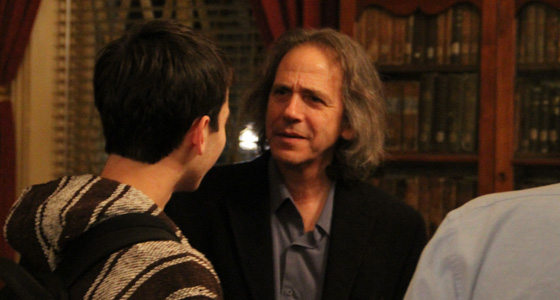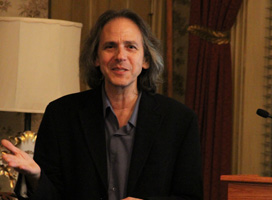

Venture Boldly

 by Laura Pochodylo '14
by Laura Pochodylo '14
Dr. Simon Lichman, the 2011-12 Visiting Israeli Scholar at Knox College, has spent years working with Israeli and Palestinian children to promote co-existence and mutual understanding.
On Thursday, he spoke on the Knox campus about what he calls the "common nature of what it means to be human" in a lecture titled, "Stories and Spaces: The Application of Folklore to Co-existence Education and Multiculturalism in Palestinian and Israeli School-Communities."
As founder of the Centre for Creativity in Education and Cultural Heritage in Jerusalem, Lichman -- an educator, folklorist, and poet -- works with Israeli and Palestinian children, encouraging them to learn more about one another.
"These children grow up sort of knowing about each other, but not quite, sort of comfortable with each other, but not quite," he said.
Lichman's program facilitates a pairing of fourth- and fifth-grade classes from a Palestinian school and a Jewish school for two years, with one hour of class a week, plus three to five joint meetings a year.
"It wasn't enough to have them in class. I really wanted them to see each other and understand ritual from a personal perspective," Lichman said.
The class periods focus on games, traditional food, and other elements of culture. Homework for Lichman's students involves having them ask their parents about games, food, and stories from their childhoods.
Parental involvement is key to the program, which began in 1991. Children's parents and other relatives often visit the classroom and the joint meetings to teach games, make food, and share their traditions.
Playing games together promotes a common ground of learning, he said, adding: "I don't want to give the impression that playing is enough. I want them to learn through playing, learn what each other's lives are really like."
"The idea is to show (children) how tradition works, that there is a continuum," Lichman said. "We're not so much interested in child-to-child connections, or teacher-to-child connections, as we are in a total community approach, with each community taking responsibility for the other community."
At the joint meetings between the Israeli and Palestinian children at each other's schools, language and cultural differences seem to fade away, and hospitality and understanding prevail, he said. For example, he showed photos of students carrying carnations to each other.
"I don't teach the students how to greet each other. They brought carnations because they thought it was the right thing to do," Lichman said.
His program integrates the subject of religion in the students' second year. They learn about symbols and artifacts of different religions, and they visit religious sites.
During a visit to a mosque, Lichman recalled, the imam explained to children that "Islam is not a religion of violence." During a visit to a temple, a rabbi told a mostly Muslim group of children that "this place is your place just as much as it is our place."
These kinds of experiences deeply affect students, Lichman said. "Something in their hearts has changed."
Lichman said he doesn't expect to change the world, but he does believe in "slowly building inter-communities." He doesn't expect complete peace or acceptance between the students or their parents, either, just a heightened understanding of each other.
"Differences are fine, but not when difference prompts a fear that leads to anger that leads to violence, which leads to not being able to understand the other group's perspective on history," Lichman said.
After listening to Lichman's lecture Thursday, Knox post-baccalaureate fellow Michelle Gerber said his efforts to promote co-existence represent "beauty in a scary situation."
"Children are so impressionable and can grow up hating without even knowing why," Gerber said. "It is beautiful to see hearts being changed in the face of violence."
The Visiting Israeli Scholar Program at Knox, established in 1995, is supported by a gift from Knox College Trustee Joseph Glossberg. The program brings Israeli scholars to the Knox campus to teach and give public lectures.
Photos by Supriya Kasaju '12
Published on September 23, 2011